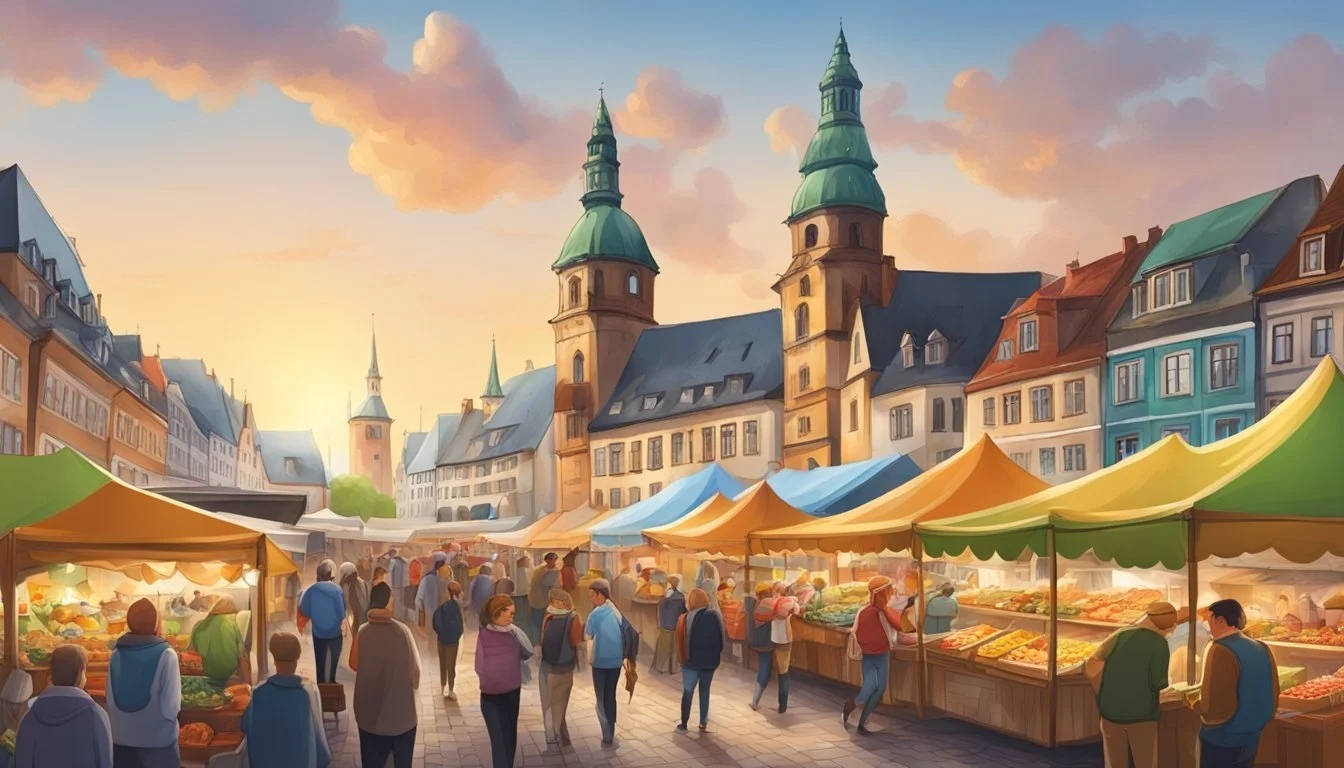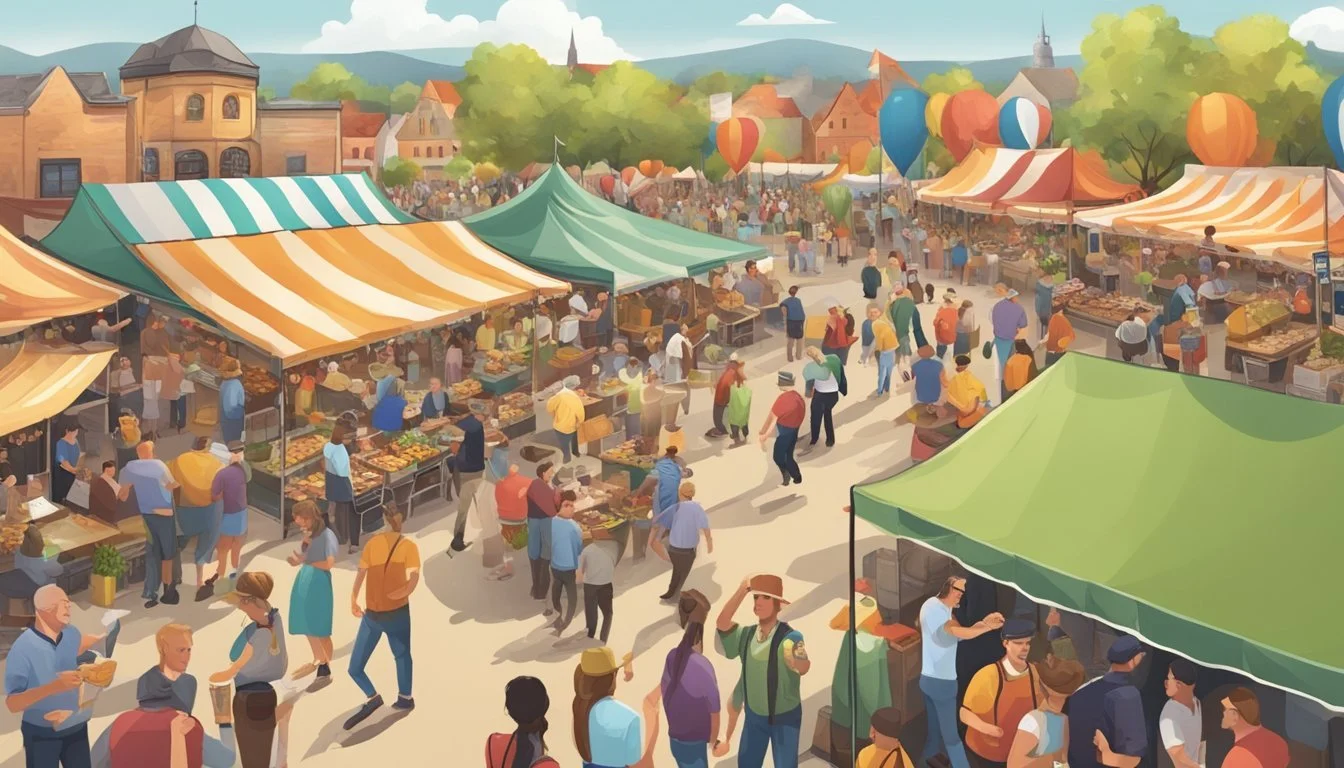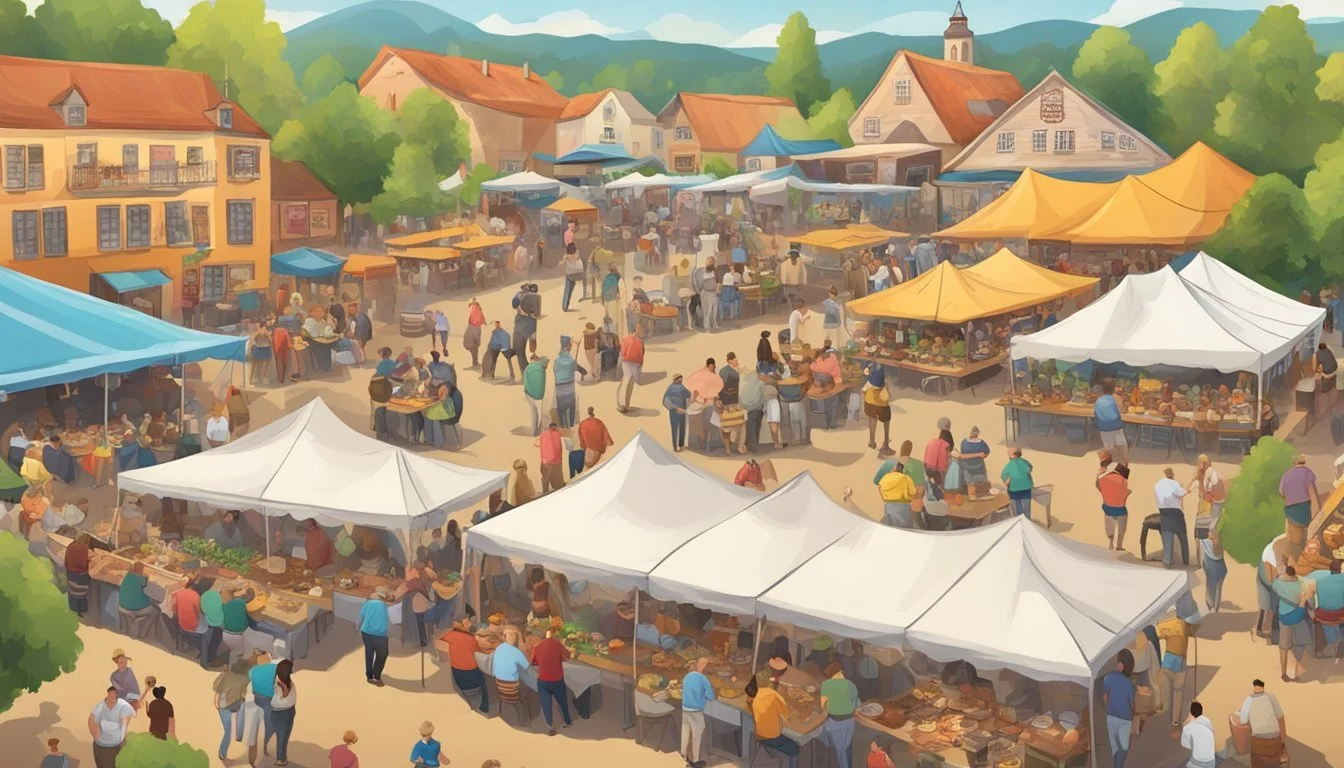The History of German Texan Food and Beer Festivals
A Culinary and Cultural Journey
The fusion of German traditions with Texan culture has profoundly shaped the local culinary and social landscape. In particular, the celebration of food and beer festivals has become a testament to this unique heritage. Food, as a universal language, has always played a pivotal role in cultural exchange. In Texas, this is clearly evidenced within the numerous festivals that highlight German culinary traditions, from sausages to pretzels, alongside locally brewed beer that harks back to Old World tastes. The marriage of German gastronomic customs with Texas’s rich agricultural resources has resulted in a hybrid cuisine that is cherished statewide.
German immigrants brought with them not only recipes and brewing techniques but also a penchant for festivity and community gatherings that have endured over generations. Oktoberfest, the world-renowned German festival celebrating beer and food, finds a strong echo in Texas with multiple towns and cities hosting their own versions. These events are a vibrant blend of Texas hospitality and German Gemütlichkeit, offering an immersive experience through music, dance, and hearty feasts. Notably, New Braunfels’ Wurstfest and Fredericksburg’s cultural festivities stand as prime examples of this enduring German influence.
The history of these gatherings is inextricably linked to the waves of German settlers who made Texas their home in the 19th century. The traditions they established integrated seamlessly into the local culture, fostering a sense of identity that has persisted. Today, these festivals are more than just an occasion for indulgence; they serve as annual reminders of the state's diverse heritage and the enduring influence of German customs on the Texan way of life.
Historical Context and Origins
The early foundations of Texan food and beer festivals can be traced back to the significant German influence established during the 19th century. This section explores the origins of German settlements in Texas and the cultural significance that gave birth to these longstanding traditions.
Early German Settlements in Texas
German immigrants first began to arrive in Texas during the 1830s, seeking economic opportunities and the promise of land. Prince Carl of Solms-Braunfels, commissioner of the noble Mainzer Adelsverein society, played a pivotal role in organizing the settlement of thousands of Germans in Texas. The Adelsverein, or the Society for the Protection of German Immigrants in Texas, aimed to establish new German settlements in the region. Notable early German-Texan communities emerged in New Braunfels and Fredericksburg, founded by Baron Otfried Hans von Meusebach, who succeeded Prince Carl and notably signed a peace treaty with the Comanche.
Year Event 1831 First German settler, Friedrich Ernst, acquires land near Austin County. 1844 Prince Carl of Solms-Braunfels founds New Braunfels. 1846 Baron Otfried Hans von Meusebach establishes Fredericksburg.
Cultural Significance
The arrival and settlement of Germans in Central Texas fostered the creation of a distinct German-Texan identity. Despite facing challenges from events such as the Civil War and the pressure to assimilate, German Texans preserved their language, education systems, and traditions. Festivals, notably those celebrating food and beer, became focal points for the community to maintain and share their heritage. They perpetuated traditional German customs, and the festivals played a role in reinforcing the German aspects of Texan culture over generations. These events also helped to sustain the unique Texas German dialect, which incorporated elements from both English and traditional German language.
Evolution of German Texan Festivals
German Texan festivals have transformed over time, showcasing the fusion of German traditions with Texan culture. These festivals serve as a testament to the rich cultural heritage established by German immigrants and their integration into the fabric of Texan identity.
Influence of German Traditions
German traditions have played an essential role in shaping festivals in Texas. Historically, Oktoberfest and Saengerfest initiated the legacy of German celebrations in the state. Oktoberfest remains a significant symbol of German culture, traditionally celebrated with a variety of beer, schnitzel, and sausage. Another German tradition, Wurstfest, takes place annually in New Braunfels, attracting over 100,000 visitors to enjoy German cuisine (What Wine Pairs Perfectly With German Cuisine) and German music.
Music, particularly, has been integral to these festivals. From polka to classical, it underscores the communal spirit of these gatherings. Fredericksburg and Boerne are significant for their contributions to preserving this musical heritage and for maintaining practices typical of German community events.
Integration with Texan Culture
As German immigrants settled in Texas, their festivals evolved to reflect the identity of their new home. A unique blend emerged within these celebrations, contributing to the character of Texan culture. Beer, always a staple at German festivals, began incorporating local Texan flavors and brewing styles.
The cuisine resulting from this intermingling is evident in Texas's own take on smoked sausages and the Czech-inspired Texas hot gut sausage. Cultural elements from both regions continue to interweave, with German architecture, food, and communal values merging seamlessly with Texan preferences and use of local ingredients.
The religious aspect, often overlooked, brought German Lutherans and Calvinists influencing the spiritual landscape of Texas. Places of worship standing today reflect German design and craftsmanship, adding another layer to the cultural heritage.
Taken as a whole, German Texan festivals have grown from ethnic enclaves into widespread celebrations that exemplify the cultural fusion of German settlers with the Lone Star State.
German Texan Food and Culinary Influence
The German influence on Texan cuisine is most evident in its distinctive dishes and brewing traditions, which have become cornerstones of the state’s food and drink culture.
Iconic German Texan Dishes
German settlers introduced a variety of dishes that have become staples in Texas. Sausages, such as bratwurst and knockwurst, are prevalent, often made using traditional recipes and methods brought over from Germany. Schnitzel, a breaded and fried meat cutlet, has been adapted to local tastes and ingredients, often featuring venison or pork. Sauerkraut, fermented cabbage, frequently accompanies these meats, providing a tangy contrast to the rich flavors of the sausages and schnitzel.
Sausages: Bratwurst, Knockwurst
Breads: Pretzels (salty and soft)
Meats: Schnitzel (venison or pork)
Sides: Sauerkraut
Brewing Traditions and Beer Styles
The German legacy in Texan brewing is significant, with early settlers establishing some of the first breweries in the state. Texan brewers often use German techniques and ingredients to create beers ranging from light pilsners to hearty bocks. The Spoetzl Brewery, maker of Shiner beers, is a testament to German-Texan brewing heritage. Today, beer gardens dot the landscape of Texas, embracing German tradition by providing a communal atmosphere to enjoy a variety of beer styles.
Spoetzl Brewery: Known for Shiner beers
Beer Styles: Pilsners, Bocks, Lagers
Cultural Spaces: Beer Gardens
With roots firmly planted in German agriculture, culture, and food traditions, Texan cuisine stretches beyond simple adoption of German food. It reflects a melding of local ingredients and flavors with German techniques, leading to a unique cuisine that continues to evolve while honoring its heritage.
Cultural Events and Celebrations
In Texas, the heritage of German Texans is celebrated with vibrant festivals that showcase traditional music, food, and beer. These events serve as a testament to the enduring influence of German culture on Texan society.
Oktoberfest in Texas
Oktoberfest, the renowned Bavarian festival, has found a hearty reception in Texas with multiple cities hosting their own versions. In Fredericksburg, a town known for its German roots, Oktoberfest is celebrated with authentic Bavarian music, and an array of German foods and crafts. Travelers and residents alike converge in the town's beer gardens to enjoy the traditional festivities.
Location: Fredericksburg, Texas
Activities: Live German music, Dancing, Authentic German cuisine
Highlights: Beer gardens, Arts and crafts
Wurstfest and Other Beer Festivals
Wurstfest in New Braunfels has become a hallmark event drawing over 100,000 guests each November. Over ten days, visitors indulge in German sausages, partake in beer tastings, and revel in the sounds of German music.
Festival Name: Wurstfest
Duration: 10 days
Location: New Braunfels, Texas
Attendees: 100,000+
While Wurstfest is the apex of German Texan revelry, beer festivals throughout the state regularly pay homage to European traditions, incorporating live music, folk dancing, and the communal spirit emblematic of German culture. These celebrations deeply reflect the German Texan community's dedication to preserving and sharing their rich heritage.
Socio-Economic Impact
German-Texan food and beer festivals have become significant socio-economic contributors, bolstering local economies and promoting tourism through their celebration of cultural heritage. These events are vital in supporting the economic and cultural landscape of Texas, influencing areas such as Fredericksburg and New Braunfels.
Contribution to Local Economies
In cities like Fredericksburg and New Braunfels, German-Texan festivals have a profound impact on local businesses. Festivals such as Wurstfest in New Braunfels inject capital into local communities, supporting everything from small retail stores to agricultural producers. Skilled artisans and vendors rely on these gatherings for a significant portion of their annual revenue.
Fredericksburg: A hub for Texan-German heritage, this city's economy thrives on the presence of festivals, attracting visitors and driving consumer spending.
New Braunfels: Home to the largest German festival in Texas, this community sees over 100,000 visitors during Wurstfest, with a direct impact on hotel, food services, and entertainment industries.
Promotion of Tourism
Texas's German heritage festivals are a magnet for tourism, providing a unique cultural experience that draws visitors not just from within the state, but nationally and internationally. San Antonio's proximity to these events facilitates spillover benefits, while towns like New Braunfels become highlighted tourist destinations.
Tourist Attraction: Events like Wurstfest showcase German culture, offering a range of activities that include traditional music, food, and beer, attracting thousands to the region.
Cultural Preservation: These festivals underscore the legacy of the Society for the Protection of German Immigrants and other institutions, bolstering tourism by preserving and promoting German-Texan cultural heritage.
The integration of German cultural elements, such as beer and culinary offerings, into Texas festivals has aided in mitigating economic hardships by providing diverse sources of income. The synergy between these celebrations and entities such as local breweries and farming sectors has contributed to the overall development and economic stability within Texas society.
Preservation of German Texan Heritage
The preservation efforts in Texas showcase a commitment to maintaining the German cultural heritage through language, education, and the upkeep of historic sites and architecture. These elements offer a glimpse into the past and play a role in contemporary community identity.
Language and Educational Institutions
The German language is a cornerstone of cultural heritage, and Texas hosts institutions that foster its preservation. Organizations like the German-Texan Heritage Society offer German language classes, ensuring that the tradition remains alive in the community. Furthermore, schools and educational events are integral in sustaining the language.
German Language Classes: Offered for various skill levels, helping to maintain linguistic traditions.
Educational Festivals: Events such as Oktoberfest incorporate elements of language learning.
Architectural and Historical Sites
German architectural styles and historical sites are well-preserved in regions across Texas, acting as beacons of heritage. Communities take pride in restoring and maintaining these landmarks, which are visited by many.
Fredericksburg and New Braunfels: Showcasing a range of architectural styles that reflect their German heritage.
German-Texan Heritage Society: This organization maintains historical properties, promotes cultural events, and supports the preservation of German traditions in Texas.
Current Challenges and Future Outlook
As German-Texan festivals continue to be a vibrant expression of cultural heritage, they face challenges in preserving their unique identity amidst an ever-diversifying cultural landscape. Balancing tradition with innovation is crucial for their sustenance.
Maintaining Cultural Identity
German-Texans are confronted with the ongoing challenge of maintaining their distinct cultural identity within the broader Texan milieu. Embracing the rich tapestry of traditions that German immigrants brought to Texas, which manifest in events like New Braunfels's Wurstfest, remains vital in keeping the German-Texan legacy intact. Communities work to preserve traditional foods and beer, which are central to festivals, alongside German language and music. They have established food and beer festivals as annual rituals to promote German culture, but these require sustained interest from younger generations to persist as living traditions.
Factors Impacting Cultural Preservation:
Intergenerational Transmission: Ensuring younger members absorb cultural knowledge.
Language Retention: The diminishing use of German language in daily life.
Adaptation and Innovation
Innovation stands as both a necessity and a challenge for the future of German-Texan festivities. Communities are adapting recipes and festivals to cater to contemporary tastes while remaining rooted in German traditions. This delicate balance is crucial in meeting the expectations of diverse attendees and integrating the broader Texan diversity into these cultural events. Beer festivals, drawing from both German and Czech influences, showcase craft beer innovations, mirroring the evolution within the Texas brewing scene. Continuous innovation will determine the endurance of these festivals, fostering a respect for heritage amidst modern adaptations.
Strategies for Modern Adaptations:
Menu Evolution: Incorporating new food trends while preserving German authenticity.
Cultural Fusion: Blending German elements with Texan and other influences.






